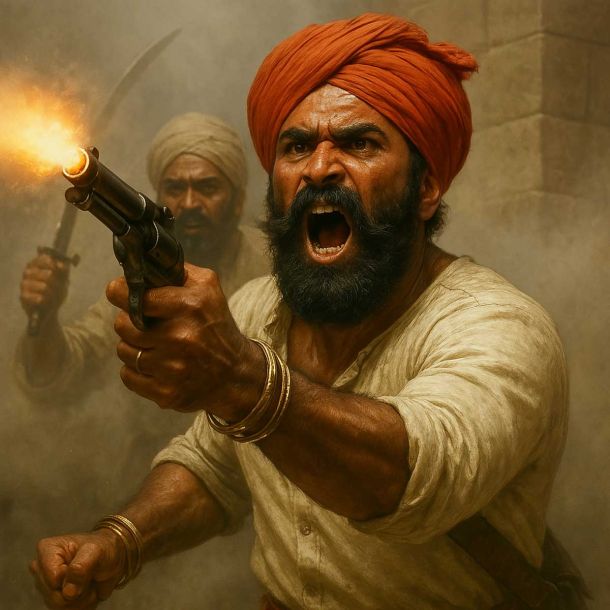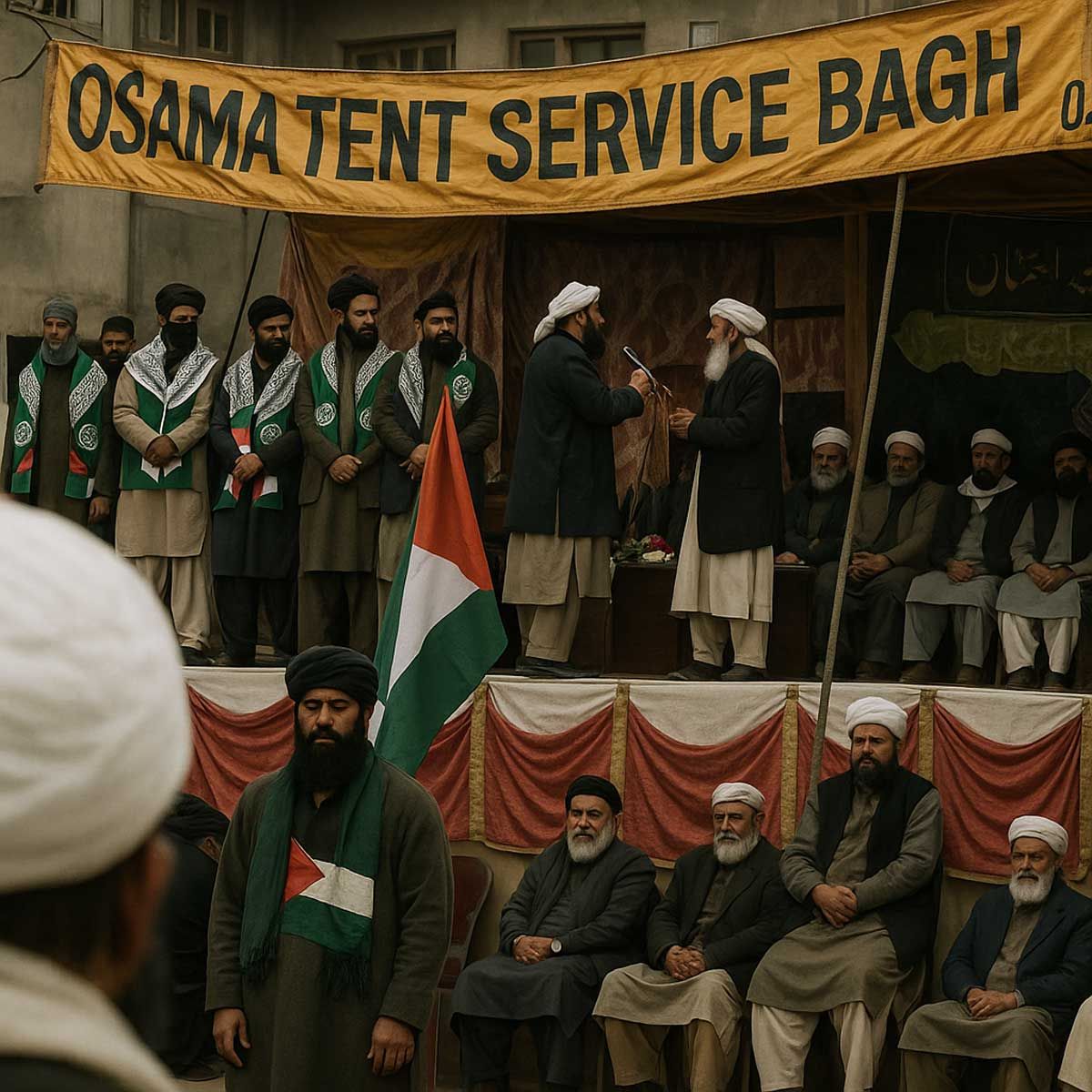Sanatan Articles
Satyaagrah
Written on
Satyaagrah
Written on
Satyaagrah
Written on
Satyaagrah
Written on
Satyaagrah
Written on
JOIN SATYAAGRAH SOCIAL MEDIA
The Forgotten Hero, the real ‘Mahatma’ - Shri Lal Bahadur Shastri
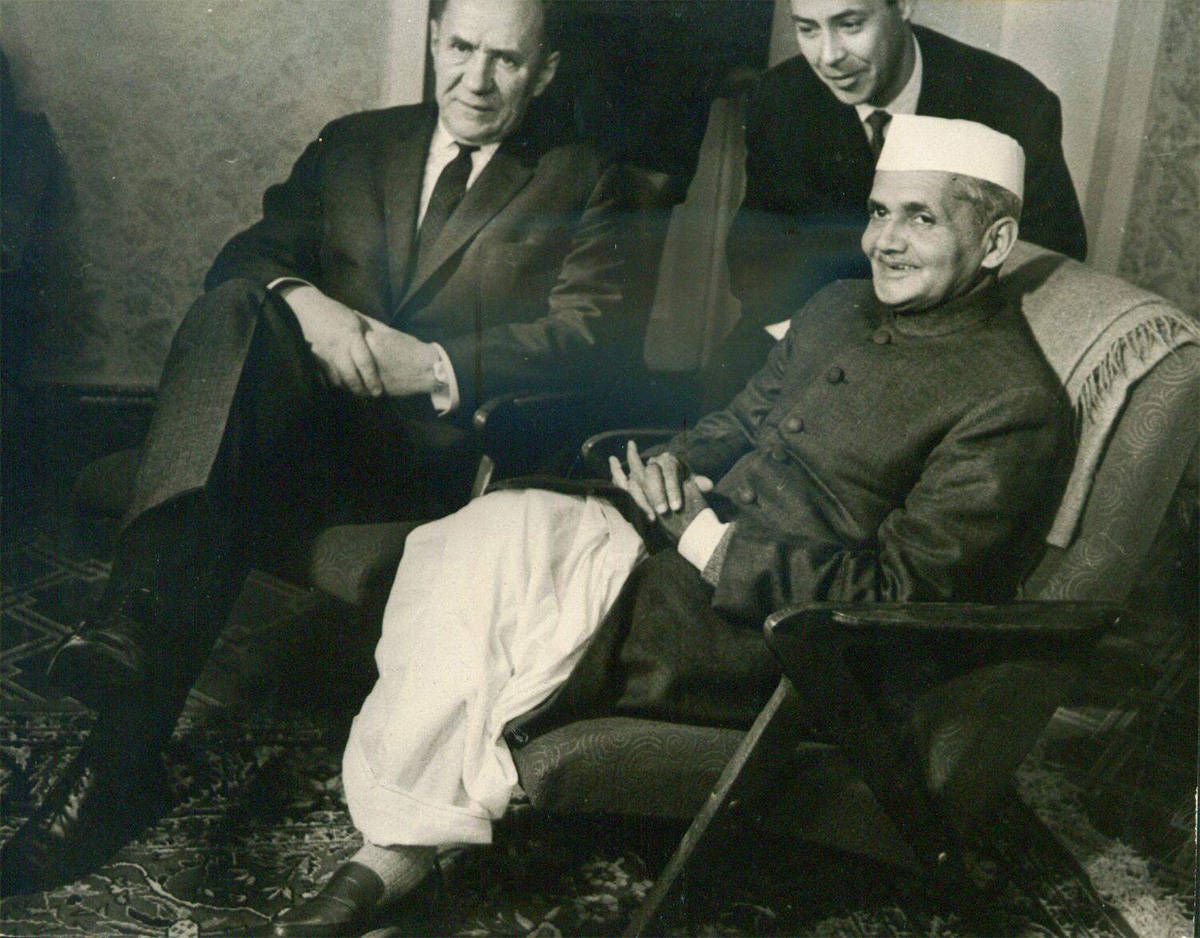
The whole nation celebrates Gandhi Jayanti with zeal and a patriotic fervour, paying homage to the Father of the Nation. However many people are unaware, that our Second Prime Minister- Lal Bahadur Shastri shared his birthday with his idol ‘Mahatma Gandhi’. Today, on the 112nd birth anniversary of Shastri Ji- known for his humility, honesty and morally elevated spectrum of thoughts; we wish to bring alive the reminiscence of the forgotten hero of Modern India!
It is easily noticeable that the entire limelight is hogged by politicians like Gandhi, Nehru and Indira Gandhi, etc, and Shastri Ji hardly gets his due. On one hand, we had Gandhi, who was known for his charisma and connect with the masses. He is still considered a huge brand today, and even though there are not many people who believe in Gandhi’s ideas and principles but still they like to keep that brand alive as they can exploit it for their own benefit. On the other hand, Shastriji doesn’t have any brand value associated with him, and that is why history has forgotten this giant, it’s really sad and unfortunate but that’s what it is.
Shastri played a leading role in Indian freedom struggle; became Parliamentary Secretary of Pandit Govind Vallabh Pant, the then chief minister of Uttar Pradesh; became the Minister of Police and Transport in Pant’s Cabinet; appointed as the Railways and Transport Minister in the Central Cabinet; also held the portfolios of Transport & Communications, Commerce and Industry, and Home Ministry in the Central cabinet and sworn in as the Prime Minister of India on 9th June 1964 filling the void created by the sudden demise of Nehru.
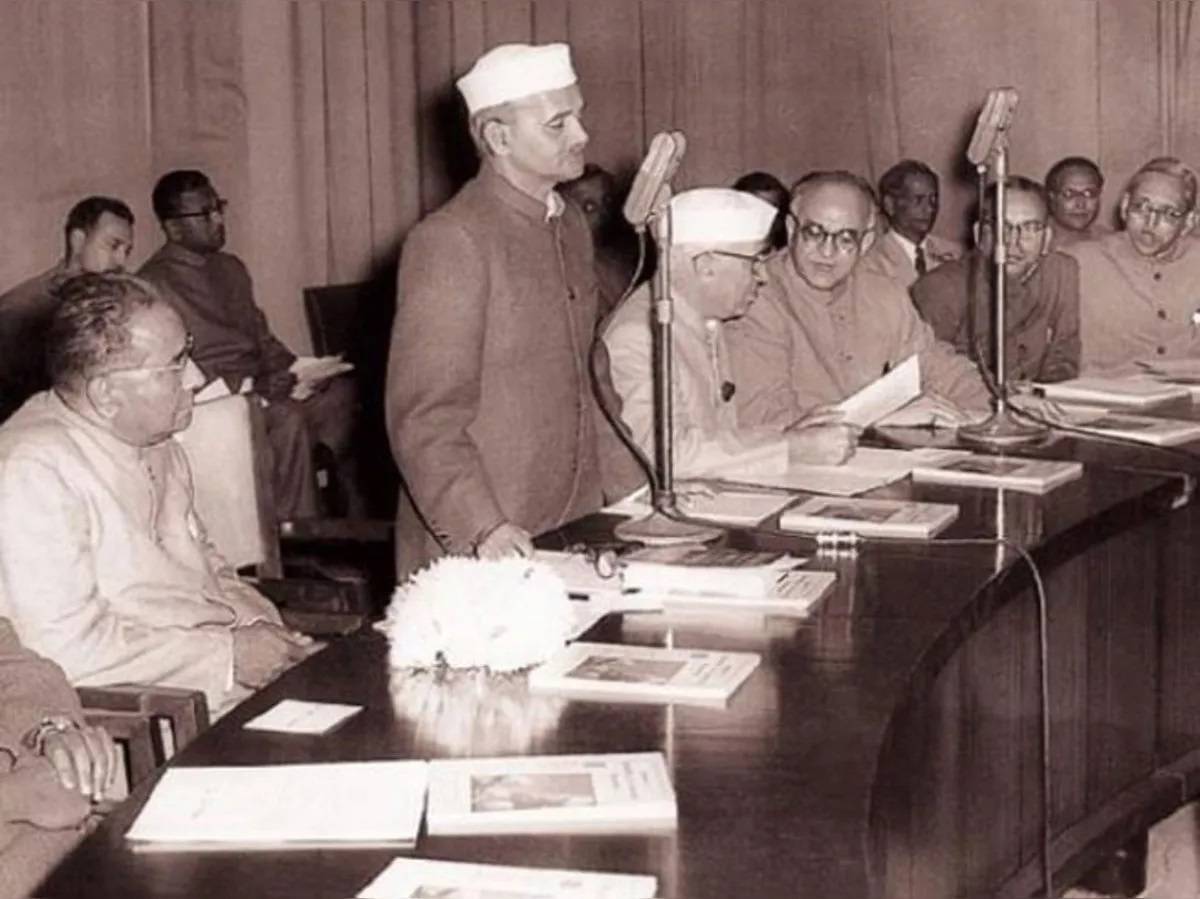 |
Relatively new to the high office, he led the country successfully through Indo-Pakistan War in 1965. His slogan ‘Jai Jawan Jai Kisan‘, still reverberates through the hearts of true patriots. He recognized the need for self-sustenance and self-reliance as the pillars to build a strong nation and wished to be remembered by his work rather than lofty promises!
Shastri Ji is still considered as one of the best Prime Minister we ever had. He was an epitome of simplicity and honesty, he was a Gandhian by soul and he lived a very simple life. He came from a very modest background and never forgot his roots and his people. For him, politics was not a profession, it was a medium to serve the people and to fulfill their aspirations.
Let's just go through a few instances which show the character of Shastri ji:
No VIP tantrums
Shastri Ji was the home minister of India, he was in Calcutta and about to catch a flight to Delhi. As the flight was in the evening and due to high traffic, it was extremely difficult for him to reach the airport on time. The then Commissioner of police decided to send a car with a siren, which can clear out the road. However, Shastri politely rejected this idea as he didn’t want to make the people of Calcutta feel any inconvenience due to a VIP movement.
No Travel with Exchequer’s money
When he was the Prime Minister, one of his sons used to go drive his official car, sometimes for a personal cause. Shastri Ji used to deposit adequate money into the government account to pay for the distance traveled by car for personal use. He never wants to become a burden on exchequers.
He made no money
It is said that when Shastri Ji passed away in 1966, he had no house or land in his possession. He had only left behind a government loan which he had taken to buy a Fiat car after he became prime minister. Past his death, the bank asked his wife, Lalita Shastri for the repayment of the loan, which she repaid from her family pension.
Public Fasting
During 1965 War with Pakistan, India was facing an acute shortage of food. Amid such a crisis, Shastri Ji announced that for the next few days they would all give up on their evening meal. He declared that “Kal se ek hafte tak sham ko chulha nahin jalega” (From tomorrow we would not cook in the evenings for a week),”. He further added that kids would get only milk and fruits, while the adults will stay hungry. It is only after he was sure that his own family could survive without a meal a day that he announced on All India Radio, urging the public to sacrifice one meal at least once a week. For the next few weeks, all people, restaurants, and eateries across India strictly followed this clarion call.
He didn’t believe in Class
When he was PM, he visited a state and due to some issues, he had to cancel the programme on account of some urgent work. The Chief Minister of that state pleaded him to not change his plans as he had made ‘first-class arrangements for his visit’, Shastri Ji responded asking ‘why do you make first-class arrangements for a third-class person?’
Architect of Green Revolution
Since independence, farmers were ignored by the then PM Nehru, who was more inclined towards factories & dams. IT was Shastri Ji who started some fundamental reforms that initiated the Green Revolution. He coined the slogan “Jai Jawan, Jai Kisan”. He had cleaned up his backyard where he used to grow crops. When news of the “Prime Minister growing his own crops” reached the common man & farmer, he became a role model and a source of inspiration for the nation which had all the resources to solve it’s food problems but was lacking a political will & a sense of direction which was solved by Shastri. That is one of the reasons he is still known as “India’s farmer PM”.
India was facing a drought situation in 1965 and literally “begging” for grains from the USA. Shastri Ji formed a group of agricultural scientists and motivated them to come up with adequate solutions to counter this situation. He identified M.S. Swaminathan’s pioneering efforts in the field of Agriculture and made him the head of the Team and ensured his full support. This triggered the Green Revolution which made India self-sufficient in grains within a decade.
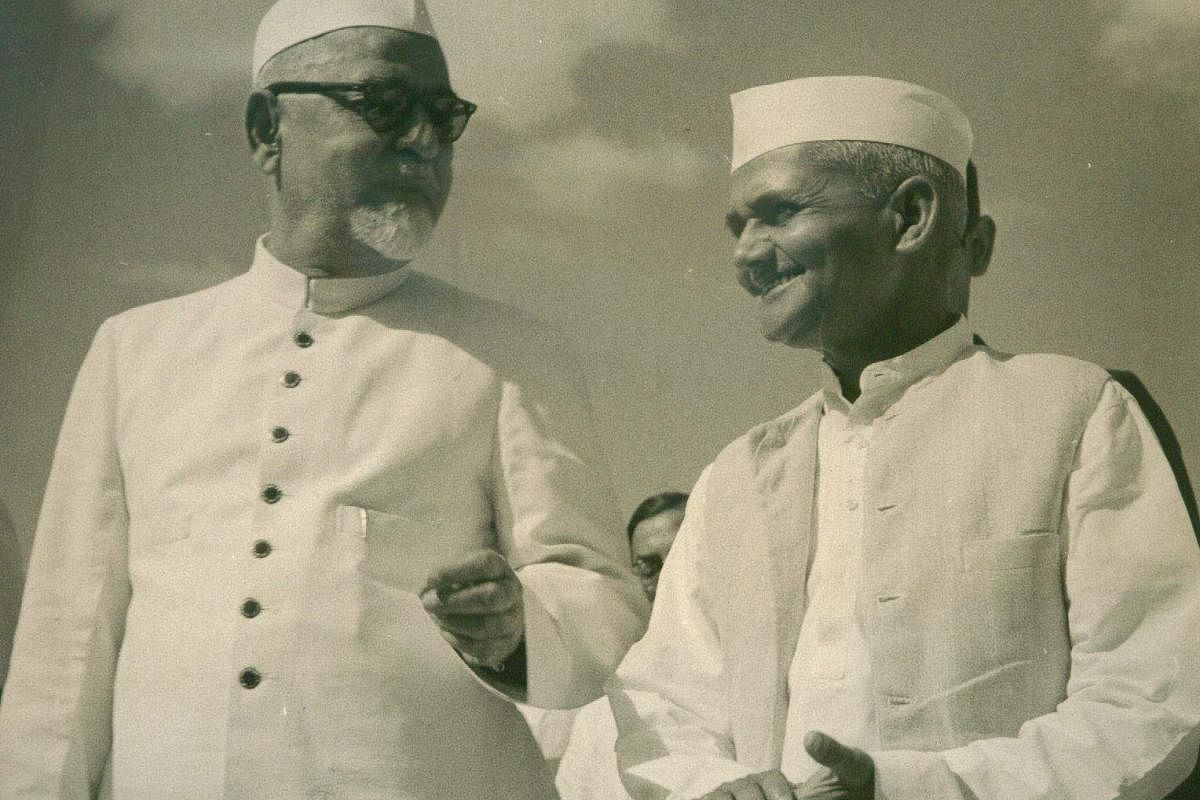 |
The force behind Milk Revolution
India was also witnessing the shortage of Milk products, he started observing a revolutionary movement in Gujarat in the form of milk cooperatives. He invited Dr. Kurien, who was the General Manager at Amul, and leading the milk revolution in Gujarat, he requested him to replicate the same model across India. This triggered the White Revolution (Operation Flood) which drastically increased milk production throughout India through the means of several cooperatives which were administered by villagers themselves, thereby producing large scale employment as well.
Shastri was an Ironman, who defeated Pakistan
While Shastri Ji was working on fundamental reforms, it was Pakistan, which underestimated the abilities of Shastri and assumed that India would quickly decay after Nehru’s death and psychological issues after 1962’s loss, and hence thought it was the right time to strike. The Pakistan army crossed the International border with 100 battle tanks, Shastri surprised everybody by asking the Armed forces to retaliate with full force. During the independence day speech, he said “Hathiyaron ka jawab hathiyaron se dange. Hamara desh rahega to hamara tiranga rahega“. This act as a great morale booster for entire India and he also further played a great role in motivating the army. The way in which he led the war to victory made him an overnight hero in India and it left Pakistan trembling for the next few years. India defeated Pakistan and forced to sign the peace treaty in Tashkent.
He considered the special status of Jammu and Kashmir as a hindrance to full integration with India. It was during Shastri's tenure as the Prime Minister that the posts of Sadar-e-Riyasat and Wazir in Jammu and Kashmir were abolished and replaced with the positions of Governor and the Chief Minister.
It is worth mentioning that from 1952 to 1965, the Sadar and Wazir remained distinct political entities, which became centres of separate politics within the country.
It is noteworthy that in September 1964, a bill to abolish Article 370 was introduced in the Lok Sabha by an Independent member, Prakashvir Shastri. It was supported by many Congress MPs, but could not be passed due to opposition from the ruling party.
Although Shastri's direct role as the Prime Minister is not visible in these affairs, a harsh letter dated March 17, 1965, by Sheikh Abdullah, who was touring Pakistan and England after his release from prison, accused Shastri of trying to reverse the order laid by Nehru. This is proof that Sheikh Abdullah was well-acquainted with Shastriji's intentions on Jammu and Kashmir.
India had bitter experiences in the armed conflict with China in 1962 and Shastriji's tenure as the Prime Minister saw a period of famine and politico-economic crisis.
At this juncture, Pakistan imposed war on India. General Ayub Khan and Zulfiqar Ali Bhutto saw in this political vacuum and economic slowdown an appropriate moment to strike. But under the able leadership of Shastriji, India not only defeated Pakistan but triggered a series of crises for that country. After this war began the political downfall of Ayub Khan, and the ethnic Bengali movement in East Pakistan got a new impetus. Next year in 1966, Mujibur Rahman started a mass movement, which culminated in the formation of a separate nation in 1971 with active cooperation from India.
When Shastriji became Prime Minister, food production in the country had slumped. At that time, carrying forward the great spirit of renunciation of personal interest in favour of national interest, he urged people to fast once a week. This period also saw the beginning of White and Green revolutions to make India self-reliant.
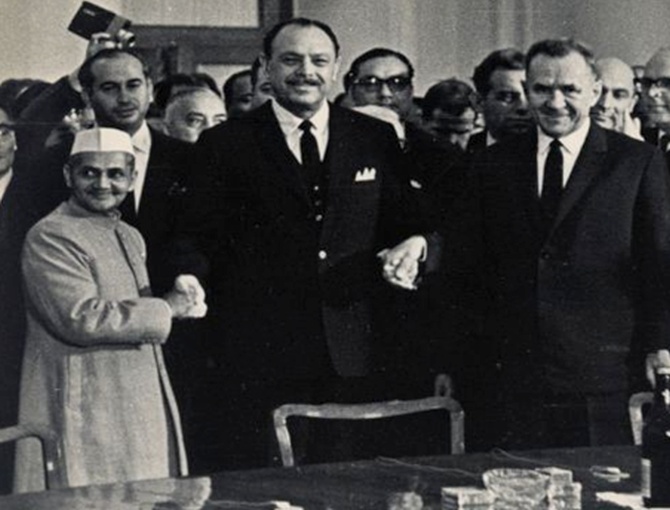 |
Shastriji was well aware of the importance of international relations for national security. Since 1960, China and Pakistan were coming closer and at such times, Shastriji keeping India's regional interests in mind gave a new direction to foreign relations.
The 1964 Shastri-Bandarnaike Agreement played an important role in improving India's strained relations with Sri Lanka due to issues related to the Tamil community in that country.
Similarly, after the 1962 military coup, relations with Burma had deteriorated and Shastri established a cordial relationship with General Ne Vin, the head of Burma's military regime, to safeguard India's interests.
The military conflicts of 1962 and 1965 underlined the importance of expanding India's military power. A nuclear-powered India could secure its borders with deterrence.
In 1965, a plutonium reprocessing plant was started in India. According to Dr Homi Jahangir Bhabha, Shastri gave the go-ahead for the production of nuclear explosives, which led to the launch of the Nuclear Explosive Design Group and the Study of Nuclear Explosions for Peaceful Purpose (SNEPP). This decision was indicative of great political will, which was rare for a long time.
Shastriji always stressed on policymaking, keeping in mind not just the immediate, but also the future. Jai Jawan Jai Kisan was not merely a slogan, but also reflected India's aspirations.
Lal Bahadur Shastri laid the foundation of modern India after Independence. As a politician and later, as an accomplished policymaker and skilled administrator, he left an indelible mark not only on the country but also on the global scene.
For us Shastri Ji is a symbol of a person who selflessly served the country without expecting anything in return, he laid down an example that how politicians should conduct themselves in public life. We certainly need more such people in our administration and political circle. For us, he is still a hero and will remain a hero for the generations to come.
Unfortunately, our Nation didn’t treat him well past his death
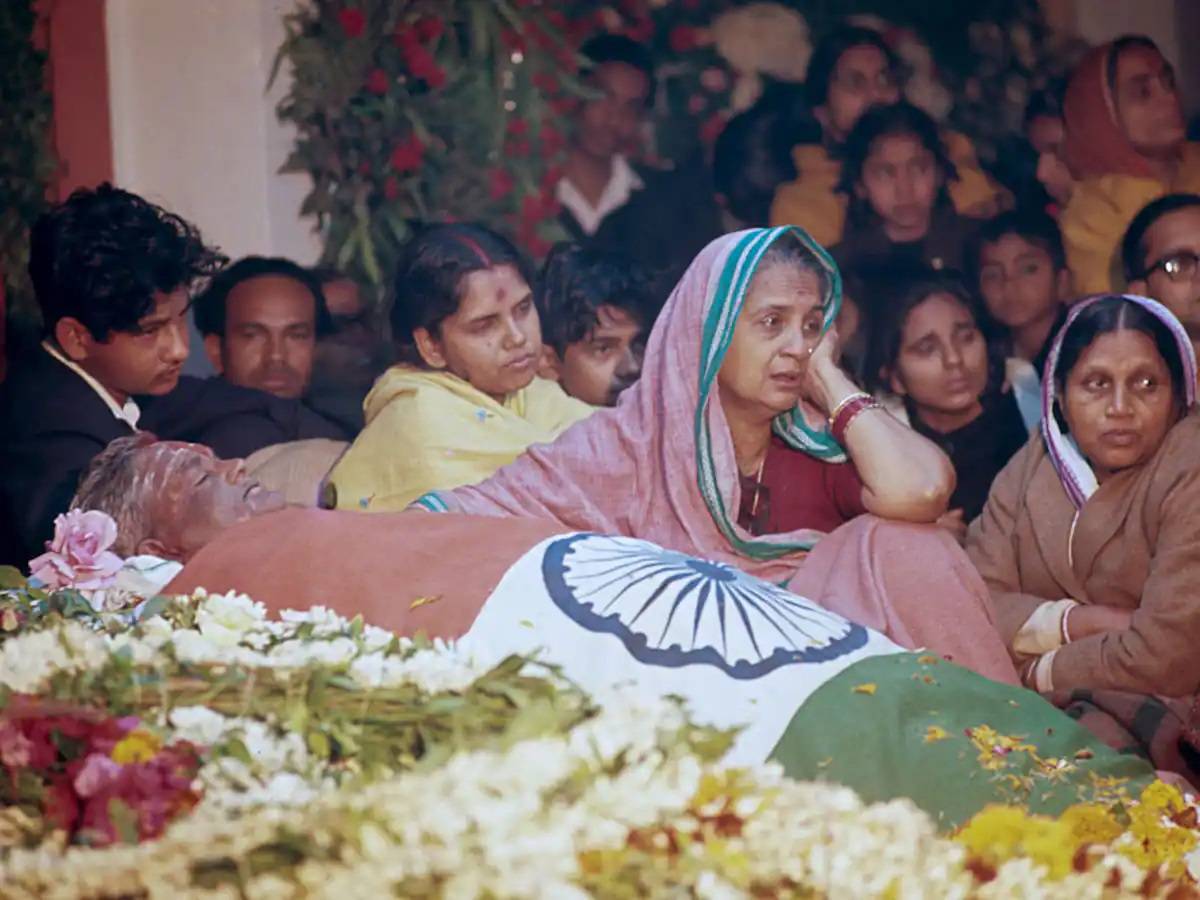 |
It is a matter of utmost disgust that Shastri Ji’s death is still a secret. During his visit to Tashkent, he breathed his last. The reason for his death is still unknown to the common man. Several Politicians and other groups asked the Government to put forth the facts and evidence, but Congress Govt rejected it citing security reasons
The Congress party did not show sufficient courtesy to perform his last rites and wanted his body to be taken to Allahabad for cremation. It was only after his wife, Lalita Devi, who fought really hard with the party leadership, the party finally agreed to cremate him with national honors at Vijay Ghat in Delhi.
His family still never found out what actually happened on that fateful night. The doctors certified that he subjugated his final breaths to a cardiac arrest. However, the suspicious ambiguities posed by the state’s secrecy have raised many questions and given birth to conspiracy theories! In his final moments, Shastri cried and said- ‘babu ji you did not give me enough time’, remembered Ram and closed his eyes forever.
- The first inquiry about the incumbent Prime Minister’s death, Raj Narain inquiry never came to conclusions and has no existing archives in the Parliament’s archives
- It was alleged that no post-mortem was done on Shastri, but the Indian government in 2009, claimed it did have a report of a medical investigation conducted by Shastri’s doctor and that no documents were destroyed
- The dark blue spots and cut near the abdomen and back of the neck signified that Post Mortem was carried out. His wife died thinking her husband had been poisoned but the PMO did nothing to wipe the wailing tears
- The two witnesses, Dr RN Chugh and Ram Nath were killed in an accident before they could testify before the Parliamentary committee in 1977
- To convict someone of a crime, you need to establish three things: motive, means (ability to commit the crime), and opportunity. CIA known for its notorious agenda to remove any threats to America from the face of the earth had all the three aforementioned weapons to poison Shastri using a double Russian Agent. In his interview with Gregory Douglas, a journalist, CIA operative Robert Crowley, confirmed how the CIA had killed Dr Homi Bhabha, one of India ‘s greatest ever scientist, and Prime Minister Lal Bahadur Shastri. As Shastri wanted to go ahead with nuclear tests, the US got wary of India emerging as a reformed state and also of Indo-Russian dominance in the region. vDouglas published a book called Conversations with the Crow based on the telephone conversations he had.
The Man with a heart of Gold and a dream of a self-sufficient India deserves an honourable commemoration and a permanent place in the hearts of every ‘Bhartiya‘!
But such a great statesman was never given the honour he deserved. It is the misfortune of this country that Indians are so obsessed with political glamour that a simple-looking but exceptional personality was forgotten.
In our Opinion, Lal Bahadur Shastri is a leader who never got his due. He was born in a poor family, led a simple personal life, austere family life, ethical professional life, did some really important reforms to help the country to regain self-reliance, finally died a poor man. He was one of the rare breeds of politicians who made no money. On the occasion of his birthday, the younger generation should salute him for all his efforts and dedication and for his contribution in building today's India.
 Support Us
Support Us
Satyagraha was born from the heart of our land, with an undying aim to unveil the true essence of Bharat. It seeks to illuminate the hidden tales of our valiant freedom fighters and the rich chronicles that haven't yet sung their complete melody in the mainstream.
While platforms like NDTV and 'The Wire' effortlessly garner funds under the banner of safeguarding democracy, we at Satyagraha walk a different path. Our strength and resonance come from you. In this journey to weave a stronger Bharat, every little contribution amplifies our voice. Let's come together, contribute as you can, and champion the true spirit of our nation.
 |  |  |
| ICICI Bank of Satyaagrah | Razorpay Bank of Satyaagrah | PayPal Bank of Satyaagrah - For International Payments |
If all above doesn't work, then try the LINK below:
Please share the article on other platforms
DISCLAIMER: The author is solely responsible for the views expressed in this article. The author carries the responsibility for citing and/or licensing of images utilized within the text. The website also frequently uses non-commercial images for representational purposes only in line with the article. We are not responsible for the authenticity of such images. If some images have a copyright issue, we request the person/entity to contact us at This email address is being protected from spambots. You need JavaScript enabled to view it. and we will take the necessary actions to resolve the issue.
Related Articles
- "What colonialism does is cause an identity crisis about one's own culture": New Research shows British colonialism killed 100 million Indians in 40 years between 1880 to 1920, report notes 'this is more than WW1 and WW2 including the Nazi holocaust'
- British PM accepted that “the tide of nationalism is running very fast in India" and the mutiny of the Royal Indian Navy in 1946 forced colonial masters Britain to leave India: What followed was betrayal by Congress
- In 1921, British forces brutally killed over 750 unarmed farmers in Munshiganj during a peaceful protest with experts calling it deadlier than Jallianwala Bagh while a memorial today stands as a grim reminder of their sacrifice & the atrocities committed
- History, tainted by biases, conceals the valor of Hemu—a Hindu king & military genius in medieval India, orchestrating 22 victories, he reshaped history at the Battle of Panipat, his strategic brilliance defied odds, leaving indelible mark on the warfare
- Mysterious death of the tallest leader Syama Prasad Mookerjee in Kashmir: He was strong critic of Nehru and founder of Bharatiya Jana Sangh (BJP today)
- "Words are the mask, actions the revealing face": For Kasturba, Gandhi prescribed faith over penicillin, Yet, when it came to Manu or self, modern surgeries weren't off the table. Ah, the enigmatic dance of traditional vs. modern in Gandhi's world!
- "हक़ीक़त": Remembering Haqiqat Rai, the 13-year-old Hindu boy, the first victim of blasphemy laws, tortured and stoned to death on Basant Panchami in 1734 under Mughal rule for resisting insults to Hindu gods, refusing to convert, and choosing martyrdom
- "You cannot change what you refuse to confront": Ashutosh Lahiry approached Nehru seeking assistance for the suffering Hindu refugees and to take action to alleviate their plight, but Nehru refused citing his commitment to Gandhian pacifism and secularism
- "लुटेरे": From a Rs 248 cr Patiala Necklace to a Rs 1000 cr Jacob Diamond used as a paperweight, India’s royal jewels now lie in foreign hands—Cartier, Christie’s, museums—far from the Maharajas who once wore them with power, pride, and unmatched grandeur
- "Symbols are powerful because they are the visible signs of invisible realities": ‘Sengol’ representing fair & equitable governance will shine in the new Parliament as a national symbol of Amrit Kaal, an era of India taking its rightful place in the world
- Ram Prasad Bismil, Tribute To The Fearless Freedom Fighter And Poet
- Madras High Court: Do not take decision on melting Temple gold till Trustees are appointed
- "One may reject the claims of sainthood made on Gandhi's behalf… and therefore feel that his basic aims were anti-human and reactionary", George Orwell’s Devastating Critique in his article 'Reflections on Gandhi'
- अथ रामचरितमानस प्रकाशन कथा: गीता प्रेस, गोरखपुर ने 1938 से रामचरितमानस का प्रकाशन शुरू किया
- Lets take a new year resolution together to liberate Bharatiya history from the paws of colonial effect



